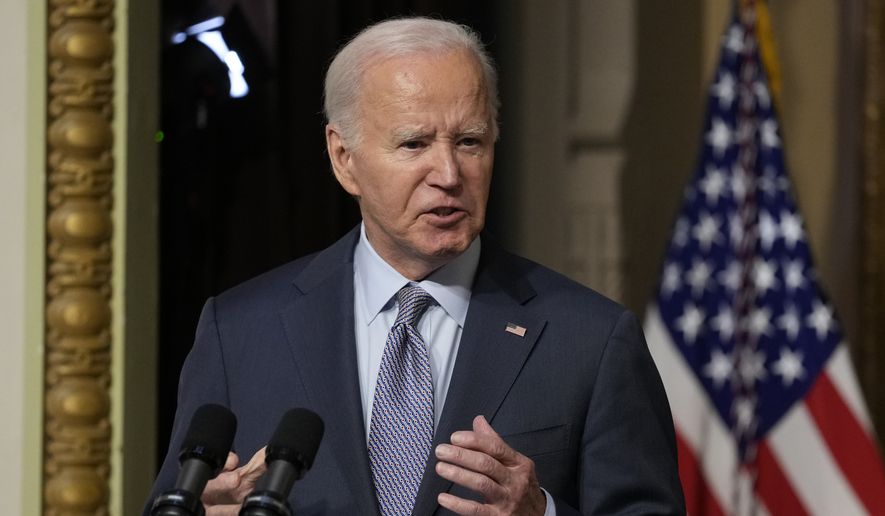The government is pleading for Americans to get another COVID-19 shot this fall, but President Biden’s messaging has shifted.
No longer is the shot called a “booster.” Now it’s an “updated” vaccine, similar to the annual flu shots the government recommends each year, and which are supposed to be tuned to the more worrying influenza variants expected to be floating around that winter.
It reflects a realization that the coronavirus has shifted to its endemic phase, similar to the flu, and also marks an attempt to overcome pandemic ennui and deep-seated concerns among much of the public about the shots’ safety and efficacy.
The new terminology is coming from the White House and the Centers for Disease Control and Prevention, where Director Mandy Cohen characterizes this year’s shot as a routine fall immunization alongside the flu vaccine and shots against RSV, which is recommended for seniors and pregnant women.
“They’d like to analogize this with the ho-hum updating of the flu vaccine each year — don’t think about it, just get it,” said William Schaffner, an infectious diseases specialist at Vanderbilt University. “They’re trying to routine-ize it and not focus on the number of shots and all that.”
Mr. Biden led the way by getting his flu shot and COVID-19 shot behind closed doors this year instead of making a show of it on camera, as he’d done in prior years.
The White House said he had a busy schedule and wanted to get it done as soon as possible, though the decision not to publicize it coincides with the 2024 campaign and Mr. Biden’s declaration that the pandemic is over.
Many people have moved on from the virus and associated worries, and hospitalizations remain relatively low despite flare-ups of cases around the country.
Paul Mango, a top official at the Department of Health and Human Services in the Trump administration, said the administration is “walking a fine line between making sure there is no significant flare-up, but also not reminding the American people that COVID may be back.”
“I think this is a good call on their part, politically,” he said.
But dropping the emergency footing and repeated scoldings could also mean fewer people get the shots.
More than 80% of Americans have gotten at least one COVID-19 shot and 70% of the population is deemed fully vaccinated. But only about half of the country gets a flu shot in a given year.
That tracks with polling that shows about half of Americans have little interest in getting another shot.
An Ipsos survey earlier this month found that 6% had gotten a booster this season and another 43% said they are likely to get it. The rest were skeptical, with 37% saying they were not at all likely to get jabbed.
“I believe most Americans are ’over’ COVID and do not wish to deal with it any longer. Attitudes are hardened,” Mr. Mango said. “Those who may be particularly vulnerable should and will likely get the updated injection, but most should not and will not. Given the hardened positions, I doubt the nomenclature change will have any impact.”
Resistance is driven by many factors.
While scientists say the risk calculus tilts in favor of the vaccine, lingering reports of adverse reactions have scared away many people.
Just as troubling are questions about efficacy, as early promises that the vaccine could prevent the disease and boosters wouldn’t be necessary have turned out to be false.
Scientists now say the shot doesn’t prevent contracting COVID-19 so much as it blunts the severity of the disease, and they say annual shots are likely to be with us for some time.
Many Americans, particularly those who identify as politically conservative, have chafed at the government’s heavy-handed tactics during the height of the COVID-19 crisis, which featured mandates, shifting advice on masks and blanket recommendations instead of advice tailored to persons most at risk from COVID-19.
Despite the softer approach this year, Mr. Mango said the CDC made an “unforced error” by recommending the updated shot for everyone this year.
“The level of trust in our public health institutions is low and cynicism very high,” Mr. Mango said. “What they should have said and recommended is, ’If you are in a category known to be vulnerable to the effects of a COVID infection, please ask your physician whether or not the updated injection would be beneficial.’”
Adding to this year’s messaging woes are supply issues, with some parts of the country reporting they don’t have enough COVID-19 shots.
Arthur Caplan, director of the division of medical ethics at the New York University Grossman School of Medicine, said many doctors’ offices and pharmacies appeared to have the flu shots but primary-care locations, in particular, were behind in acquiring the COVID-19 vaccines.
Pharmacies said they are working through hiccups.
“All of our stores now have the supply needed to meet patient demand in their communities. Additional appointments have been added to our scheduler and will continue to be made available at our sites nationwide based on supply,” Walgreens said in a statement to The Washington Times.
CVS Health said it is receiving updated COVID-19 vaccines on a rolling basis but seeing delivery delays from its wholesalers.
For more information, visit The Washington Times COVID-19 resource page.
• Tom Howell Jr. can be reached at thowell@washingtontimes.com.




Please read our comment policy before commenting.